“In the Cards”
Written by Truly Barr Clark & Scott Neal and Ronald D. Moore
Directed by Michael Dorn
Season 5, Episode 25
Production episode 40510-523
Original air date: June 9, 1997
Stardate: 50929.4
Station log: Dinner at the Sisko cabin is a morbid affair. The U.S.S. Tian An Men has gone missing, the latest in a series of ships to disappear near the Cardassian border. Sisko’s attempts to change the subject are an abject failure. The mood is oppressive and awkward and depressing and maudlin, and the cherry on top of the whole thing: after everyone leaves, Sisko is informed that Winn is coming to the station in the morning.
Jake, meanwhile, is worried about his father. Usually the captain is the one who cheers everyone up when they’re down, but he’s just as worried about the Dominion as everyone else.
Quark is running an auction for the Bajorans of some items salvaged off a derelict freighter. Most of it is junk, but as Jake and Nog peruse the lots, they see a mint-condition 1951 Willie Mays rookie card. Jake decides that it’s just the thing to cheer his father up, and he’s going to get it for him. The teaser ends with those fateful words, “How hard can that be?”
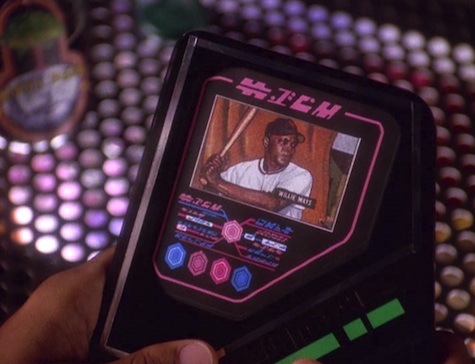
Jake’s first stumbling block is that, as a citizen of the Federation, he doesn’t actually have any money. Nog has five bars of latinum stowed under his bed, and Jake guilts Nog into using his money to bid on the card. (Nog’s initial staunch refusal wilts under Jake’s very unsubtle reminder of how Sisko sponsored his Academy application and believed in him when no one else would and so on until Nog gives in.)
Winn meets with Sisko and they take a walk along the Promenade. Winn is meeting with Weyoun—a meeting requested by the Dominion—and she expresses concern that growing tensions between the Federation and the Dominion will result in Bajor’s destruction. Sisko for once agrees with her, and promises to do everything he can to safeguard Bajor.
Quark’s auction is going poorly. The bids are low, the crowd unenthusiastic. However, Jake and Nog perk up when the lot containing the Mays rookie card (as well as a bunch of other items) comes up. However, Jake is hugely outbid by a human named Giger, who makes a preemptive bid of ten bars.
Jake refuses to give up, convinced that he’s meant to give that card to his father. So they approach Giger, but he not only won’t even talk to them, he accuses them of being part of the soulless minions of orthodoxy, says several other impressively crazy things, then buggers off to his quarters. However, he relents and offers to meet with Jake and Nog.
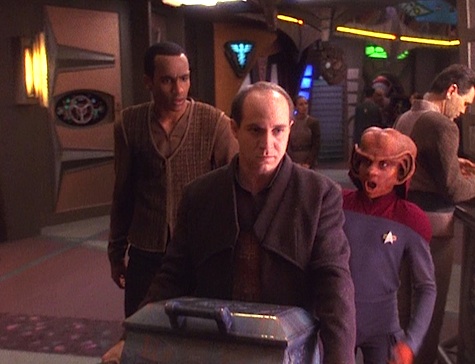
Giger has filled his quarters with a ton of equipment. After doing a background check on Jake and Nog, he has decided that they’re not with the soulless minions of orthodoxy, and so is willing to trade the card for a list of items. He needs them to construct a machine that will cure the true cause of death: cellular ennui. Cells do the same thing every day from conception onward, until they get fed up and give up and just stop. Giger is convinced that if he can learn to teach cells new mitochondrial tricks, he can cure death. It’s taken him fifteen years and the loss of his reputation (to say the least), but he’s almost finished his cellular regeneration and entertainment system. He needs a few more things he can’t get his hands on, and he figures the station commander’s son and a promising young cadet could probably succeed where he has failed. Jake and Nog are iffy because Giger’s very obviously nuts, but they go for it.
One part O’Brien can get for them, but it involves scrounging for a part that he doesn’t have time to look for. However, once Nog and Jake offer to take over his shift so he can go kayaking on the holosuite, he’s willing to find it and have it sent to them.
Next on the list is something medical, which Bashir is willing to get for them in exchange for retrieving Kukalaka, his childhood teddy bear, from Leeta, who never gave it back after she and Bashir split up. Nog sneaks into her quarters and steals it while she sleeps.
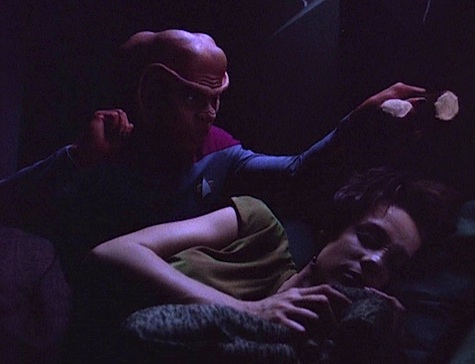
Weyoun arrives on the station, greeted by Sisko, who is totally not happy to see him, though Weyoun is thrilled to be back on the station and chatting with Sisko—and the Vorta’s very disappointed at how cranky Sisko is. After Weyoun meets with Winn, the kai tells Sisko that Weyoun has offered to sign a nonaggression pact with Bajor. Winn is seriously considering it, especially after Sisko told them not to join the Federation. Sisko tells her to stall, to keep Bajor’s options open until they reach a crisis point.
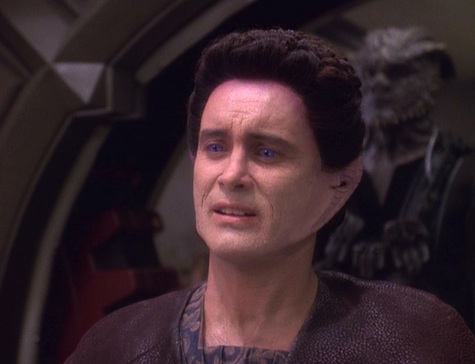
Jake delivers half the items to Giger, including something that makes one of his machines hum loud enough to be heard by Weyoun in the quarters right above. Meanwhile, they’re continuing to do favors, mostly because Jake refuses to allow Nog to say why they need this stuff, as he wants it to be a surprise. So Jake is punching up Kira’s speech to the agricultural society with some humor while Nog is listening to Worf’s operas to filter out the subharmonic distortion.
Unfortunately, when they bring the last of the items to Giger’s cabin, they find an empty room. And Odo has no record of anyone using those quarters. Jake then sees that Winn is speaking to the vedek Jake was initially bidding against, who probably wanted the Bajoran mandala in the lot. Jake thinks that Winn may have had Giger kidnapped to get the mandala back, which is a bit extreme—more so when they actually accuse the kai of kidnapping and thievery. That gets them seriously reamed out by Sisko and confined to quarters, especially when Jake refuses to tell the truth, preferring to let his father think they got drunk in Quark’s.
Then they’re unexpectedly transported to Weyoun’s quarters and held at gunpoint by his Jem’Hadar. Weyoun wants the truth as to why they’ve been meeting with Giger and the entire senior staff, not to mention Winn after her meeting with Weyoun. Weyoun has already kidnapped Giger. They tell Weyoun the truth, which he doesn’t believe—so Jake spins an elaborate story about how they’re working for Starfleet Intelligence investigating this “Willie Mays,” who didn’t exist in any historical record until a few days ago. He must be a time traveler wreaking havoc on the timestream, and he must be stopped!
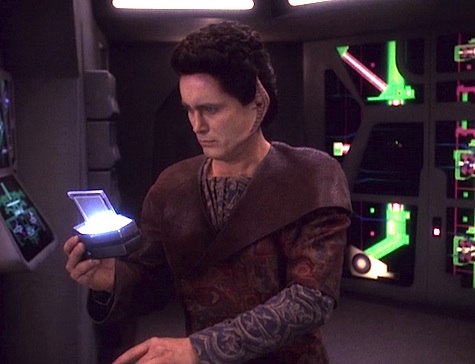
At that point, Weyoun buys the first story, to Jake and Nog’s relief, and he also is fascinated by Giger’s research. He lets Jake and Nog go so he and Giger can discuss immortality and creative genetics—and Weyoun gives them the card, too.
Sisko makes a captain’s log, noting that everyone seems to be in a better mood. O’Brien has gone kayaking, Bashir has his teddy bear, Worf is greatly enjoying his remastered opera, Kira’s speech is a big hit—and Sisko loves his baseball card. (Leeta, though, isn’t too happy, as she simply cannot find Kukalaka. But she’s an evil teddy bear thief, and therefore deserves what she gets…)
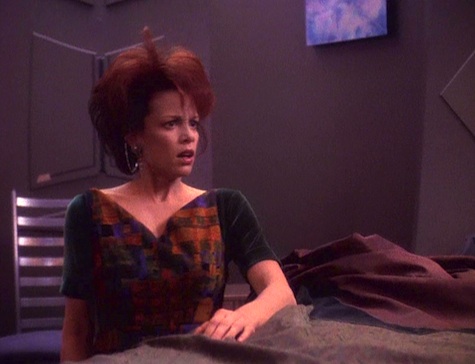
Can’t we just reverse the polarity? Giger’s theory is that cells need to be excited and entertained so they won’t die of ennui. For some inexplicable reason, he has been unable to gain traction with this theory among the greater scientific community.
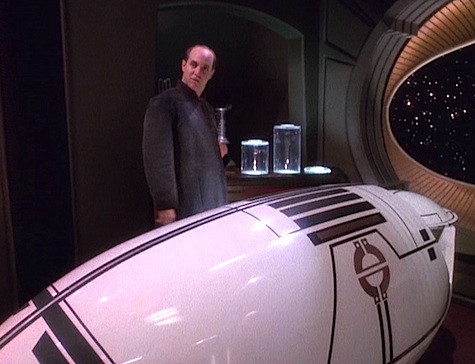
The Sisko is of Bajor: Sisko’s attempts to cheer the crew by inviting them to dinner and talk about subjects like trips to Bajor or babies walking are abject failures, and Sisko himself is in an awful mood, tearing into both Weyoun and his son and Nog.
Don’t ask my opinion next time: When Kira escorts Winn to Sisko’s office, Winn then turns to Kira and says, “You may leave now, child,” and Kira thanks her in the snottiest, screw-you-iest manner possible.
Rules of Acquisition: Initially, Jake is bidding against a Bajoran vedek. Nog confidently tells Jake that he’ll bow out at two bars. When Jake questions this, Nog just stares at him and says, “I am still a Ferengi.”
Victory is life: The Dominion is offering a nonaggression pact with Bajor. It’s unclear why they’re offering it (they could very easily conquer Bajor, after all), though it makes perfect sense that Bajor would take it.
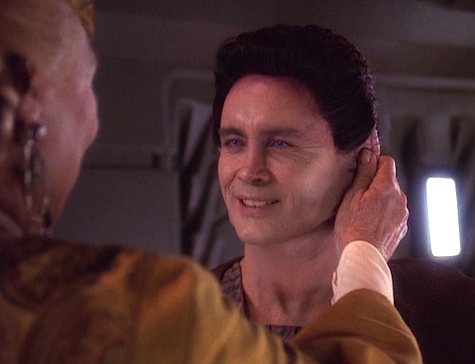
Keep your ears open:“I’m not crazy—I’m just a little obsessed.”
“A little?”
Jake showing remarkable self-awareness, and Nog thinking he’s not showing enough.
Welcome aboard: Aron Eisenberg is back for the third week in a row as Nog. Other recurring regulars who pop in include Louise Fletcher as Winn, Jeffrey Combs as Weyoun, and Chase Masterson as Leeta.
Plus we have the great Canadian character actor Brian Markinson as Giger. Markinson was seen as the ill-fated Vorin in TNG’s “Homeward” and twice played Lieutenant Durst on Voyager in “Cathexis” and “Faces”—in the former, he also played Chakotay (kinda—Chakotay was possessing Durst), and in the latter, he also played Sulan.
Trivial matters: This episode is Michael Dorn’s first directorial credit. He’ll go on to direct two more DS9 episodes, as well as an episode of Enterprise. After directing an episode focused on a Willie Mays baseball card, he’ll appear as an analogue of Mays in “Far Beyond the Stars.”
Brian Markinson’s character was given the name of Giger solely in order to make the “Lions and Gigers and bears” “Oh my” gag work.
This episode introduces a nonaggression pact between Bajor and the Dominion, which will happen next time in “Call to Arms,” and which was foreseen as necessary by Sisko in “Rapture,” when he said that Bajor had to stand alone or it would fall. The nonaggression pact will keep Bajor out of the hostilities between the Dominion and the remaining Alpha Quadrant powers.
Jake’s line about how humans “work to better ourselves and the rest of humanity” is a riff on Picard’s similar line in First Contact, also scripted by Ronald D. Moore. Moore said in an AOL chat in 1999: “I take great glee at mocking my own work.”
This episode was likely at least in part inspired by the M*A*S*H episode “The Price of Tomato Juice,” in which Radar gets involved in a chain of favors in order to get regular tomato juice for Colonel Potter.
One of the other items in the lot with the card is a pre-Surak Vulcan bracelet. Surak was established in “The Savage Curtain” on the original series as the founder of modern Vulcan philosophies of logic and suppression of emotion. Another item was a transtator, which was established in the original series’ “A Piece of the Action” as the basis for most 23rd-century technology. A third item was a matador painting that Morn is seen walking out of the auction having purchased. That painting will play a role in “Who Mourns for Morn?”
Kukalaka was first mentioned in “The Quickening” as the teddy bear on which Bashir performed his first-ever surgery as a child. This is the first time the bear has been seen. He’ll be seen again in “Inquisition.” Leeta and Bashir broke up in “Let He Who is Without Sin…,” and it seemed to be an amicable split, but that was before the bear thievery was revealed…
The Tian An Men, named after the plaza where a famous student demonstration took place in 1989, was first mentioned in TNG’s “Redemption II” (also a Moore script), and will finally be seen in “Tears of the Prophets.” The ship also appears in the novel The 34th Rule by Armin Shimerman, David R. George III, and Eric A. Stillwell and in the videogame Klingon Academy.
Walk with the Prophets: “The entire future of the galaxy may depend on us tracking down Willie Mays—and stopping him.” I absolutely adore this episode. Part of it is that we’ve been spending this show watching Jake and Nog grow up. And here they actually graduate to the A-plot, after spending so much time in the first few seasons being B-plot fodder (“A Man Alone,” “Progress,” “The Storyteller,” etc.).
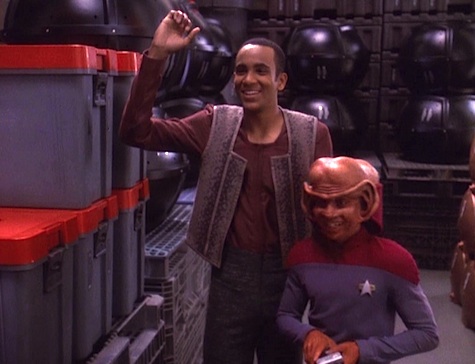
Of course, their B-plots were often for comic relief purposes, and their A-plot is also, but it’s more a case of comic relief after a lot of heavy stuff, and in preparation for even heavier stuff. And it works. The depression the crew feels in Sisko’s quarters at the top of the episode is palpable—and understandable, given what’s been happening since Cardassia joined the Dominion in “By Inferno’s Light.”
I’ve been saying all along that one of the cornerstones of DS9 is the Sisko family dynamic, and we see it beautifully here, with the added bonus of the superlative chemistry that Cirroc Lofton and Aron Eisenberg have developed over five years. Seeing Jake want so desperately to do something good for his father, and to find the perfect gift only to find it constantly out of his reach is heartbreaking, and you find yourself rooting for Jake against all odds, from the harmless, hilarious lunacy of Giger to the very real danger of Winn and Weyoun.
In particular, though, what I like about this episode is that it reminds me of me. I’m a generally optimistic, happy person. I don’t hang onto bad moods for very long. (Indeed, while I was in the midst of doing this rewatch, something happened that put me in an incredibly foul mood, but after an hour or so, it passed and I am back to my usual chirpy self.) Generally when I encounter someone in a bad mood my instinct is to try to cheer that person up so they aren’t unhappy anymore. (This doesn’t always work, nor is it always appreciated…)
So I felt what Jake was feeling, could empathize with his desire to do something for his father, and understood why it was so important that he get that, especially knowing that the gift would be just the right thing for him.
And along the way, they got to do a bunch of mitzvahs, which were probably even more beneficial to Kira, Worf, Bashir, and O’Brien than the card was to Sisko.
This episode is the perfect quiet, sweet, delightful episode prior to the craziness that’s about to kick in with the next episode and last through the beginning of season six. It’s not just the calm before the storm, but the chance to relax and enjoy yourself before the storm.
Warp factor rating: 9
Keith R.A. DeCandido will be at Shore Leave 36 this weekend at the Hunt Valley Inn just north of Baltimore. Other guests include Trek actors Leonard Nimoy (via Skype) and Robert Picardo, Stargate actors Richard Dean Anderson, Teryl Rothery, and Michael Welch, Torchwood actor Eve Myles, and Grimm actor Silas Weir Mitchell; fellow Trek novelists Christopher L. Bennett, Kirsten Beyer, Greg Cox, Peter David, Kevin Dilmore, Michael Jan Friedman, Dave Galanter, Robert Greenberger, Jeffrey Lang, William Leisner, David Mack, Melissa Scott, Dayton Ward, Howard Weinstein, and David Niall Wilson; plus a ton more author guests, science guests, artist guests, and performers (among the latter, your humble rewatcher’s band Boogie Knights). Click here for more info.










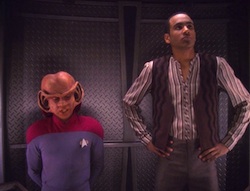
I should add that I came close to bumping this down to an 8 because we never got a followup wherein Leeta sought counselling to deal with her ursokleptomania.
Bear thievery is a serious problem.
…..the more you know….
—Keith R.A. DeCandido
“And along the way, they got to do a bunch of mitzvahs”
Thank you for this. :-)
— Michael A. Burstein
Love this episode. Just truly enjoy it every time I watch it. You basically said everything I would have, so I don’t have anything to add. Cheers!
Now this IS an under-rated DS9 classic, and doesn’t get near enough praise or publicity. A neglected jewel.
Another bit of trivia:
The Matador painting that appears at the end of auction scene is bought by Morn, whom you can see walking out with at the beginning of the scene where Jake and Nog first talk to Giger.
The Matador painting will play an important role in the season 6 episode: “Who morns for Morn?”.
Ooh, thanks for the reminder NWCtim!
Robin! To the edit function!
—Bat-Keith
It would not surprise me if another inspiration behind this episode were actually Shakespeare’s Much Ado About Nothing. Not because the plot is similar, but because it follows the same structure of promoting what should be a subplot (Jake tries to buy a baseball card, Beatrice and Benedick snipe at each other while pretending not to be in love) to the main central plot, while making the events that really matter (Bajor in talkes with the Dominion over a non-aggression plot, Don John trying to ignite a political scandal by wrecking the marriage of Claudio and Hero) happen in the background.
That said, while I enjoyed what they were trying to do, I found the episode altogether too schmaltzy and lightweight for my taste. And the “Lions and Gigers and bears, oh my” bit just made me think “oh no, they’re not really going there are they. Oh, they are!”
A well done chain of favors story is a thing of beauty and this one is a prime example. They hit all the right beats — including having everything fall apart at the end — and don’t spend overlong on minor favors. We get quick glimpses of things like Jake pepping up Kira’s speech and Nog fine-tuning Worf’s recordings, just enough for us to see the whole chain without dwelling on things that might be boring.
Unless my memory is playing tricks on me, there’s another chain of favors episode at some point. There’s even a point where the captain’s desk is removed from his office as part of the chain. Or have I hallucinated that?
ETA: One possible reason for the Dominion to offer a non-aggression pact is a belief that a move against Bajor might draw the Federation into a direct conflict before they (the Dominion) are ready. That might not be the case, but they could believe it given Sisko’s strong presence and connection to Bajor. Without the pact, they might have a lot of pressure from Cardassia to invade.
One things still bothers me – why did Giger want the lot? And why did he want it so badly that he was willing to pay 10 bars of latinum?
Aw, no mention about the in-joke of the Re-Animator himself being interested in immortality experiments? I laughed my butt off at that part.
I wish they’d stuck with this alterted Sisko/Winn dynamic for the remainder of the series instead of backpedaling in “The Reckoning”.
I love that the two have spent five years butting heads, but now are relucatantly having to put that aside to keep Bajor safe.
@8 – You are not hallucinating; you’re thinking of Season 7’s Treachery, Faith and the Great River.
Since one of the mitzvahs involved Kukalaka, it was a bear mitzvah!
I am not ashamed.
I absolutely love this episode… as KRAD said, Cirroc Lofton and Aron Eisenberg shine. Plus, Weyoun’s interrogation of them is just brilliant. The whole thing is a joy to watch.
@DemetriosX I agree re: the non-agression pact. Bajor is the linchpin for a whole geopolitical (astropolitical?) mess if you attack it, given that the Federation would have to jump in to defend it, then the Klingons would probably get involved… the Dominion is agressive, but it isn’t stupid.
8. Well another reason would be to secure this side of the wormhole as well as the planetary masses and stations for effectively cheap while not having to worry about insurrections. While the Dominion is very good at exerting control and maintain it, it is cheaper to do it with good will and treaties than crushing the opposition and there’s more benefit in having intact societies and resource bases.
Yep, a good episode. All I can add is what a great combination of words “soulless minions of orthodoxy” is. I’ll have to use that one day.
@13 – You shouldn’t be. I laughed out loud.
I recall that I was prepared to really dislike this episode. I knew it was going to be one of those “let’s keep it light and funny before it all hits the fan” kind of episodes, and usually those fall flat. This one didn’t. I loved it. My favorite part was the crazy story about Willie Mays being a time traveller and Weyoun recognizing it as complete BS, thus accepting the truth as the truth. That was completely unexpected and greatly appreciated. :)
Why doesn’t the Dominion just conquer Bajor? Well, probably because Dukat has been urging them to do so, and right now keeping the newly conquered-in-all-but-name Cardassia under much firmer control, and not letting them think they call the shots, is probably more important than striking at Bajor and the very fragile wormhole is. If Bajor is willing to consent to a non-aggression treaty and allow the Dominion free movement through its space, then it can wait until after they’ve got Cardassia housetrained. Not to mention that the Vorta’s job will be to negotiate Bajor’s admission to the Dominion using diplomatic means. No need to use stormtroopers when you can use words, that is what the Vorta are bred for.
I can see why Giger is not taken seriously. He just hasn’t made his technobabble ridiculous enough to be taken seriously in the Trek-verse. If only he’d called it a “bio-genic, quantum celluar-degeneration arrestor”, he’d have probably been given his own institute. Its all about the branding, I’m telling you.
I love this episode. One of my favorites because of the humor. Fun stuff.
Bobby
The Dominion securing a non-agression pact with Bajor would also be a major PR coup.
That would signal to the rest of the quadrant that the Bajorans didn’t have faith in the UFP to defend it and make the Federation look even weaker.
Indeed, such a PR coup will happen in the next episode as we know and push Sisko to make his fateful decision there.
I absolutely love this episode. I couldn’t stop laughing and grinning. It’s brilliant. Not only the most nonstop hilarious episode of the entire franchise, but so uplifting and joyous because it’s motivated by the desire to do good, and ends up with everyone benefitted by it in some way (except Leeta, but it’s not like she’d have trouble finding someone else to cuddle up with at night). And speaking of Moore making fun of himself, I love the way Jake spins a yarn that’s exactly the kind of time-travel shenanigans Trek does all the time, and Weyoun finds it completely unbelievable. And how cool that Weyoun actually lets him have the card!
It just struck me that this is a counterpart to “The Visitor” in a very real sense. Both episodes show how far Jake will go out of love for his father, both episodes affirm the power and beauty of that relationship, and both episodes very successfully evoke strong emotions. And it goes to show that joy and laughter can be as potent at making an emotional point as tragedy and tears. I wish one or two of Moore’s later series had remembered that more often.
I’d totally forgotten that Brian Markinson was Dr. Giger. He is pretty ubiquitous, though my favorite role of his is still the android Lotan from Stargate SG-1‘s “Scorched Earth.”
Love the soulless minions of orthodoxy.
Reading ahead a little to refresh my memory, in the next episode it turns out that the Dominion is also negotiating non-aggression treaties with the Romulans, Tholians, Miradorn, and others. So it seems like they are not singling Bajor out in particular for favorable treatment. They are checking off possible targets, and narrowing down possible allies of the Federation and Klingons, and generally getting their ducks in a row.
Forgot to add:
Handing out those non-aggression treaties like candy was probably also a way of at least attempting to break the Federation off from the Klingons. Its a very overt threat, and if the Federation was going to cash in the chips, that would be the way to do it. Looks like the Dominion wasn’t quite ready to drop that hammer either, otherwise they’d be more overt in the ship losses along the Cardassian border. That was probably also one of the reasons Weyoun was ultimately kind to Jake, little bit of shmoozing for the Captain’s son. Long shot, but it might have paid off. Such is a Vorta’s life. At this point there was still a vague hope on both sides that war could be avoided.
Good observation about Weyoun trying to score brownie points with Sisko through Jake.
Never thought of it that way.
@10. It’s funny not just because he’s the Re-Animator, but because Weyoun himself has an. . . interesting relationship with mortality.
Yeah, I loved how Weyoun’s deaths became something of a running gag.
It’s like what happened with Ba’al over on Stargate SG-1 once he started cloning himself.
I think the reason the Dominion offered Bajor a non-agression pact is because of the wormhole; specifically, the wormhole aliens.
Think about it. The Dominion has had shape-shifters all over the Alpha Quadrant, gathering intelligence, for three years. They would know just as much as we do about the wormhole aliens, their powers, and their connection to Bajor. Heck, they probably know more than we do. So they knew that to anger the wormhole aliens was to endanger the vital passage to the Alpha Quadrant they knew they needed for the war. What ends up happening in “Tears of the Prophets” is probably the very worst case scenario the Dominion was hoping to avoid by giving Bajor a non-agression pact.
That, and invading a world is a lot different to taking a space station from a public relations perspective. Conquering Bajor, a world just emerging from the grip of a horrible occupation inflicted by the Dominion’s main AQ allies would have been a PR disaster, and would have pressed the Federation into trying to liberate the system much sooner than they did. Much better to keep the Bajor system nice and (relatively) peaceful than to have it in a state of turmoil.
*Love* this ep. It’s one of my top five DS9 eps. It never fails to make me smile. This and Take Me Out to the Holosuite rock!
Thanks for reminding me to watch it again, Mr. Stinkburger!
I loved this episode. Any episode focusing on the Sisko men and their devotion to each other is always a great hour, and its great to see how far Jake and Nog have grown as friends. Also a nice change of pace to actually agree with Kai Winn on anything, particularly when Winn points out Sisko was the one who kept Bajor from joining the Federation.
The whole hour is a delight, a nice quiet break before approaching storm.
awesome that this was Michael Dorn’s first episode behind the big chair.
you’d think you’d go for something a little more treky losing his directoral virginity….but instead he went with this and scored a major hit. i thought i was the only one to secretly think this episode was awesome….seems i am not alone at all.
A brilliant episode on all accounts. Just like TNG’s Inner Light, episode number 25 of season 5 delivers!
This was a very welcome Jake/Nog story. Five seasons of development paying off. This episode came at the perfect point in the season. Season 5’s second half was as dark and grimm as Star Trek could possibly get. This episode epitomizes the bleak future these characters have in store. If I were serving on a station about to get overrun by the Dominion, with the whole quadrant shifting, my nerves wouldn’t be so calm. Naturally, this comedy plot came at the right time.
As a side note, they really should have put Aron Eisenberg in the opening credits. He appeared in more episodes than Cirroc.
As for the plot, a great job paying off threads established this season, as well as setting up the finale. It also puts Winn in a new dimension, as she’s forced to make a deal with the devil in order to protect her world. It’s an interesting reversal of her role as defender of Bajoran faith. During the occupation, she fought the Cardassians in her own way despite becoming blinded by greed and lust for power. She still cared for the world she grew up in.
I really wish Moore had pushed for broad comedy on Battlestar Galactica. Moments like Baltar’s bathroom scene on that first season were priceless. In the Cards is nothing but moments like these. Seriously, I wish I had the imagination to come up with a line like soulless minions of orthodoxy. It’s ridiculous, and it works! This may very well be my favorite Ron Moore script. Excellent debut for Michael Dorn in the director’s chair as well. Not quite Jonathan Frakes good, but he’s getting there.
I used to mistakenly call this episode House of Cards long before Kevin Spacey resurrected the name.
Good point bringing up The Visitor parallels. This episode wouldn’t have happened had that timeline taken place.
Also, I have to applaud not only Behr and Wolfe for creating Weyoun, their best Vorta character, but also Jeffrey Combs for Weyoun’s nuances. He fits so perfectly with such a silly plot. You couldn’t do this with the Female Founder or a Jem’Hadar.
This is yet another great example of how DS9 can take a well-worn story idea, one we’ve seen on any number of other shows, and put a fresh spin on it to the pleasant surprise of all.
@13, JAWolf, one million points to you for that joke.
A truly great and funny episode. I love little semi-slice of life episodes like this. This one also does a great job of showing off what I love about Weyoun as a villain – he can be threatening, but at other times he seems quite friendly and nice to be around (as long as you don’t forget that he’s probably never being genuine).
-Andy
@33, Yeah, Weyoun really was a great character.
If Dukat hadn’t gone the route he goes next season, Weyoun would never have held the spot of my favorite DS9 baddie.
I love any episode that mocks the Federation’s Mary Suetopia. I think it was SF Debris that pointed out that by not having currency, Jake is utterly ignorant of its value, and is basically asking Nog to give up his entire life’s savings for him.
@37 – While that is essentially correct, it could be argued that as Nog is now a Starfleet cadet, he is part of the Federation, and therefore himself no longer in need of money. So his “life savings” are technically worthless.
@38: Well, no, he hasn’t renounced his Ferengi citizenship.
@38 – It seems a roundabout way for Nog to finally give Sisko the apprenticeship bribe that Sisko refused for writing Nog’s letter of recommendation to Starfleet. Nog’s Ferengi honor is now satisfied and Sisko cannot refuse because it is technically from Jake.
I started my own binge-rewatch in June and am just now catching up with this one. First, many thanks to Keith for the time and research that go into each post. I love learning more about the backstory of my favorite Trek series. Second, I LOVE this episode – the humor, the camaraderie, and the big hug at the end. Avery Brooks and Cirroc Lofton made me believe they were father and son. It was the character development that drew me to this series, and their relationship was one of the best.
Agreed that this is a sweet episode. On paper, it actually sounds like the kind of thing that would be cheesy or over the top (Hijinks ensue when Jake and Nog attempt to procure a vintage baseball card for Sisko!) but the acting and little character bits really helped sell it. The Giger character could have been especially horrible, but he did a great job.
Winn seemed almost reasonable in this episode! Also, her zinger towards Weyoun at the end was pretty awesome.
THEE ULTIMATE line in this episode
“SOULESS DOMINIONS OF ORTHODOXY” totally the description of most leaderships of this day and age, in the US and world. Republican or Democrats. Tyrants or Parliments. The 1% dominanting the 99%
How do things like Jake buying root beer at Quarks’s happen if they don’t at least some way adapt to “Federation citizens need currency when liiving on a space station that needs currency”? (Jake should have 2.5 bars from his share of the No-Jay corp as well, as this episode implies he hasn’t regularly been spending latinum).
I also didn’t like the scene where Jake blithley guilted Nog into giving up all his savings; (maybe unimportant to a 24th Century human, but important to a 21st century viewer, and part of the cultural identity of a 24th C Ferengi). You can imagine the scene if they had just bought it with latinum, either from the auction or from Giger, Jake would take half the credit and not even understand why he doesn’t deserve it.
You know, usually when a series does a light episode to break up some really heavy stuff either happening, or about to happen, I roll my eyes. But this, this is a glorious masterpiece that harkens back to the Marx Bros. The comedy is rapid fire and works 99% of the time. But what I think works the best is how this episode really reminds us why we like these characters which makes all the heavy stuff that comes later so much more relevant.
The SOULESS MINIONS of ORTHODOXY
That is all, that made the episode for me and is a phrase I use for most political conspiracy ideas that float through my head!
I have to ask the same question as Rancho Unicorno. Why was Giger so interested in bidding on the lot?
Also, I like Nog a lot these days, but I found him sneaking into Leeta’s quarters through the ductwork a little creepy. Makes me wonder what else he’s been up to on DS9?
I’m typically not not a fan of Jake episodes, but this one was very good.
7: The Wizard of Oz reference is no different than The Godfather riff from the S1 episode The Nagus. 9 and 47: Giger didn’t want the whole lot, just the power cell – but it meant he had to buy a lot of things he had no use for in order to get it. 11: Yeah, I agree. With the outbreak of the Dominion War, it might have been nice for Sisko and (especially) Winn to come to the mutual conclusion that their little feud seems pretty immaterial when held up against such major galactic events. 32: If there had been a S8, Nog probably would have become a cast regular, since he gets promoted to Lieutenant at the end of S7.
Something i always wondered about the post money universe thing in star trek and two of those things came up in this episode. The first is how does star fleet pay for quark hollo-suite time if they have no money. Seconds, they still need money and this episode shows it. Money is just a medium to transfer goods more efficiently than barter. but apparently enlightened societies go backwards and waste everyone’s times with figuring out how to barter goods. Now the only really credible way i have found that star trek answered the question about not needing money is the replicator. The only reason we need money is to facility trade and we only need trade because goods are scarce across the world so we need to exchange with each other to survive but in a world of post scarcity you dont really need much money. However i still would think in star trek land you need money because there is one scarce good that still exist, your time and body. These are limited resources even in star trek land and there it would seem reasonable in order to exchange your time or intellect or labor you still need a medium like money to facilitate that. Not sure what that medium would be. I mean gold can be replicated so it worthless basically but in recent years with rise of crypto currency i suppose they could come up with something in that world. I always found the post money world the weakest part of all star trek universes.
@49/ Justin,
A moneyless society is obviously an incoherent idea. A society free from starvation and homelessness is not.
I think an unsolvable conflict is that there are only so many places from which you can have a view of Niagara Falls, for example. Those who are able to enjoy this must have either money or influence to accomplish it.
On the other hand, a society that possessed great wealth (in the form of technology) might be able to do much to restore the lost beauty of the world, particularly if world population levels permitted the restoration of natural habitats.
@49: In regards to how Starfleet personnel pay for goods and services at Quark’s, maybe Starfleet personnel assigned to non-Federation worlds are given a special monthly entertainment allowance (i.e some sort of Federation credit that local merchants can convert into gold pressed latinum.) They probably wouldn’t think of this special allowance as being money (since it wouldn’t be of any value to them on Federation worlds), but it would give them the ability to engage with the local economy.
The idea behind a moneyless society isn’t that it doesn’t use money at all, just that money is optional. Basic survival is guaranteed, most resources are inexhaustible, inequality is gone, etc., and economic activity and property ownership are just optional activities pursued by choice.
I probably came off a little more snarky than i meant to be. I just always got the feeling that star trek was imagined as a universe that transcended poverty, war, inequality by getting rid of money based economies and that the world was made better after they moved in this direction. but to me i always understood it the other way around. when you move closer and closer to post scarcity ie the replicators in star trek,the ultimate technology in this regard, the less and less there would be poverty, war, and inequality. I do get this is just interpreting star trek through my own point of view. so it could be all BS lol.
@53/Justin: They didn’t have replicators or a moneyless society until TNG, though. They defeated war, poverty, and inequality (at least among humans) a couple of centuries before then, according to First Contact.
I see i was conflating some stuff. Thanks for the info Christopher.
Just rewatching this myself. It occurs to me that it probably isn’t a coincidence that the auction lot number is 49, given that there’s a rather paranoid Thomas Pynchon novella named “The Crying of Lot 49.” It’s a complex book but I’m curious if there are any other allusions…
S
Well, after having to sit through the last episode and seeing characters get killed off left and right because they where not on the main cast, we kind of earned a comical relief episode Especially one that works so well. Too bad I have no idea who Willie Mays is, since Baseball isn’t a thing in my country and the people of the future where absolutely right to have abandoned… No… to will have abandoned?…. To be going to abandon?… this sport, because it IS so very boring. But maybe the episode would have been even better by knowing which card they where chasing there.
@54 Surely you must be off by a century or so – TOS had replicators on the Enterprise and In STIV:TVH Kirk says something to the effect that they still use money here when they arrive in 20th century San Francisco. That would be a very strange thing to say if they still used money in the 23rd century.
@58/sd dude: No, TOS had synthesizers. The term “replicator” was not coined until season 2 of TNG. A replicator is a transporter-based device that stores objects’ molecular patterns and creates exact replicas instantaneously. (The concept existed in season 1 of TNG, but the season 1 writers’ bible merely refers to meals being created by “the in-ship transporter system” and delivered via “wall slots.”) The TOS synthesizers were not transporter-based or instantaneous. Indeed, the food slots were supposed to be an automatic dumbwaiter system delivering meals that were swiftly prepared and cooked from perfectly-preserved raw ingredients by advanced robotic means, according to The Making of Star Trek.
And TVH was the first-ever mention of a moneyless 23rd century. TOS itself made repeated references to money and capitalism — discussions of how much money Starfleet had invested in training its officers, Kirk telling people “you’ve earned your pay for the week,” (di)lithium miners being described as filthy rich, Harry Mudd and Cyrano Jones overtly seeking profit, Flint being rich enough to buy his own planet, etc. So I take the line in TVH to mean merely that they still used physical currency in the 20th century whereas the 23rd century used electronic credit instead — which isn’t so different from today, where most of our money is transferred electronically using cards or PayPal or the like.
@56: As a Thomas Pynchon fan I love that the auction scene literally ended with the crying of lot 49.
https://en.wikipedia.org/wiki/The_Crying_of_Lot_49
@60 Yep! It CAN’T be coincidence.
The other thing I love about this episode is the characterization of Giger. I’ve been earning a living as a scientist for a lot of years now, and we have all encountered our share of straight-up cranks. In scripting and performance, Giger is the best representation of this usually-harmless species I’ve seen on the screen.
S
Lockdown Rewatch.. an episode just about everyone loves and quite rightly so, I was especially amused by Nogs increasing irritation with Jake’s make believe stories and I always loved the reaction of the normally stone faced Jem Hadar when Weyoun says “I believe you”. Priceless.